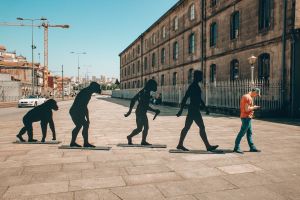Where Are the Grown-Ups?

The Kavanaugh hearings and their tattle-tale antics, the various hash-tag movements, the growing passion for the nanny state, the adolescent lasciviousness of leaders in institutional and corporate life—sadly the church included—and childish, tongue-waving, na-na-na-na-na tweets, even from the president of the United States, provoke a question: Where are the grown-ups?
The schoolyard style, tone, and behaviors—alleged and actual—that constitute policy debate and political discourse in our age reveal not only a coarsening of our culture, but its childishness as well.
A national immaturity has set in that makes the country as unstable as a school bus full of warring seventh-graders (with apologies to decent seventh-graders everywhere).
How have we come to this? Where will it lead? Where are the grown-ups?
We got here through a loss of the focus on transcendence and an ensuing overwrought fascination with the immanent. To lose the idea of God as "high and lifted up" to whom all are accountable, and whose eyes search the earth, beholding the evil and the good (Proverbs 15:3) is to lose reverence for God and His creation, and respect for one another.
It's amazing how children strive for their best when parents are watching their performance. The recognition of Coram Deo—living before God's face—helps mature us as we recognize His transcendent majesty.
Overwrought immanence means that we and our priorities take preference over all others. The principal has left the building, and we can go after one another with a vengeance. Decorum and dignity, accountability and responsibility are driven out by the chaos of selfish children and adolescents fighting for first place in line.
Where does all this lead? Perhaps to a "Lord of the Flies" jungle of deluded intrigue, suspicion, paranoia, and death.
On the other hand, our contemporary madness could take us into tyrannical statism. Secular progressivism's vision is to force change on all the institutions on which our civilization is based. It poses under the banners of new liberties, but the fact that it must force change means that if it becomes dominant in government, then the state will become the instrument of coercion.
Even more than it is now.
No person, wrote G.K. Chesterton, "is such a legalistic as the good secularist."
Is it possible we will end up in a 1984-like dystopia? Current developments in artificial intelligence seem to point that way. Many who think about the implications are alarmed.
Whatever the case, there are hard facts our childish-adolescent culture must face.
1. The less our internal control, the greater the need for external control.
Edmund Burke said that people "are qualified for civil liberty in exact proportion to their disposition to put moral chains upon their own appetites...in proportion as they are more disposed to listen to the counsels of the wise and good, in preference to the flattery of knaves. Society cannot exist, unless a controlling power upon will and appetite be placed somewhere; and the less of it there is within, the more there must be without. It is ordained in the eternal constitution of things, that men of intemperate minds cannot be free. Their passions forge their fetters."
2. The less our maturity, the greater our need for guardians.
In Galatians 3, the Apostle Paul describes the Law as a "custodian" over a child. The goal is for the young one to grow up, and no longer need the nanny or guardian. Our culture seems increasingly in need of such a guardian. Some people even long for the nanny state.
3. The greater our antinomian anarchy, the greater our need for disciplinarians. "Antinomians" are philosophically opposed to the rule of law. Anarchists carry out the antinomian worldview. Early on, most of us are antinomian anarchists to some degree in our disobedient childishness and rebellious teens. The hope is that we will grow into mature, civilized persons. Meanwhile, on the level of societal immaturity we live in the tensely awkward condition of concern for police brutality while simultaneously there is an increasing need for law officers to hold off our anarchy.
Something will always have the place of transcendence in our lives. "Transcendence" refers to God being the "not-me"—the absolute Other. The immature loathe the idea that they themselves are not Number One. Therefore, maturity comes when we acknowledge the God who is revealed in the Bible. He is the giver of law, and, at the same time, of grace.
It's either Him or all those immanent things—the idols—which, in our immaturity, we put in His place, from the self to the state.
We urgently and desperately need to grow up.




























